Frankfurt am Main: Pic Spam
Nov. 1st, 2021 10:53 amThere are two Frankfurts of relevance for Fredercians: Frankfurt an der Oder, the lesser known one, where Fritz on Christmas 1731 was given a concert organized by students as a Christmas surprise, very likely a concert starring Fredersdorf (and thus causing their first meeting), for reasons more detailed here, and Frankfurt am Main, the better known Frankfurt, among many other things the city where Holy Roman Emperors were voted for and crowned. (Meaning, for our particular ensemble of characters: where Franz Stephan and Joseph as well as Mt's luckless rival the Wittelsbach Emperor Karl Albrecht were crowned.) Also the city where Fritz had Voltaire arrested without having any legal authority to do so there whatsoever. And of course, hometown to Goethe.

Unfortunately, Frankfurt am Main was heavily bombed in WWII, which is why a lot of the old buildings either had to be rebuild from scratch or at the very least had been burned out, which means their interior had to be reconstructed. Which is also why you see a lot of modern skyscrapers, and the whole town is nicknamed "Mainhattan".
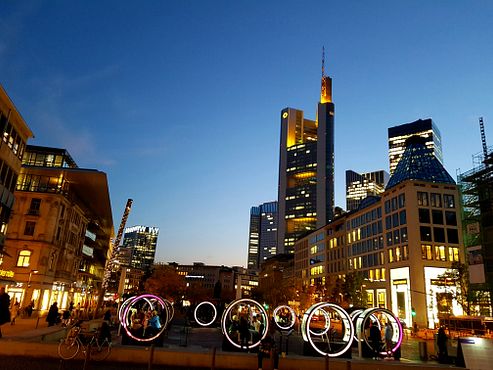
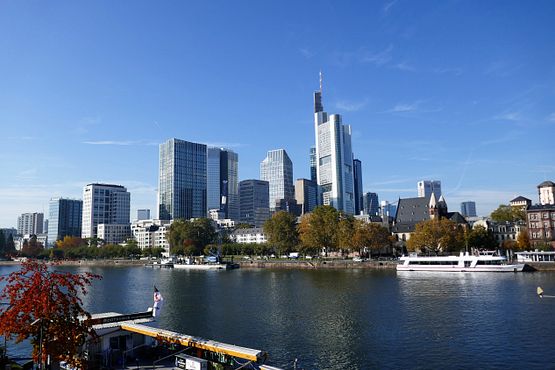
However, reconstruction is a thing. Take the cathedral. Now, the Princes Electors already got together here for voting in the Middle Ages. What they voted for was, strictly speaking, not the Emperor but the King of the Romans (and Germans). Since no one who hadn't been German King first had become Emperor since Charlemagne, you get the point. Having the Imperial coronation here, otoh, was not something regular until the late Renaissance/early Baroque, since most medieval Emperors tried to get crowned by the Pope himself in Rome. The last Emperor to be crowned by the Pope was Charles V., who transferred the site of the coronation to Bologna instead of Rome, given there was still much resentment in Rome for the brutal sacking his toops had inflicted on the city just a few years earlier. Later Emperors simplified their lives and had the coronation in Frankfurt instead, not least because once the Reformation had changed Europe irrevocably, the prestige of being crowned by the Pope was far less than it used to be.
By the 18th century, the voting and the coronation of Emperors still took place in Frankfurt, and we have detailed descriptions by the Duc de Croy of the, shall we say, less than joyful voting and coronation of Karl Albrecht, and by Goethe of both the coronations of Franz Stephan (which he had from his grandparents) and of Joseph (which he saw himself as a teenager). MT could have been crowned as Imperial Consort if she wanted to in Frankfurt; she didn't want to, having been crowned as monarch in her own right in Hungary and Bohemia already. However, she was in Frankfurt as well, several months pregnant, having lunched with Wilhelmine en route. The house where she was staying for her time in Frankfurt, Haus Frauenstein, was utterly destroyed in WWII, and the building now standing there looks rather modern, but overall the square with the city hall, the so called "Römer" (= Roman), is one of the most attractive locations of Frankfurt. Here it is from several angles:
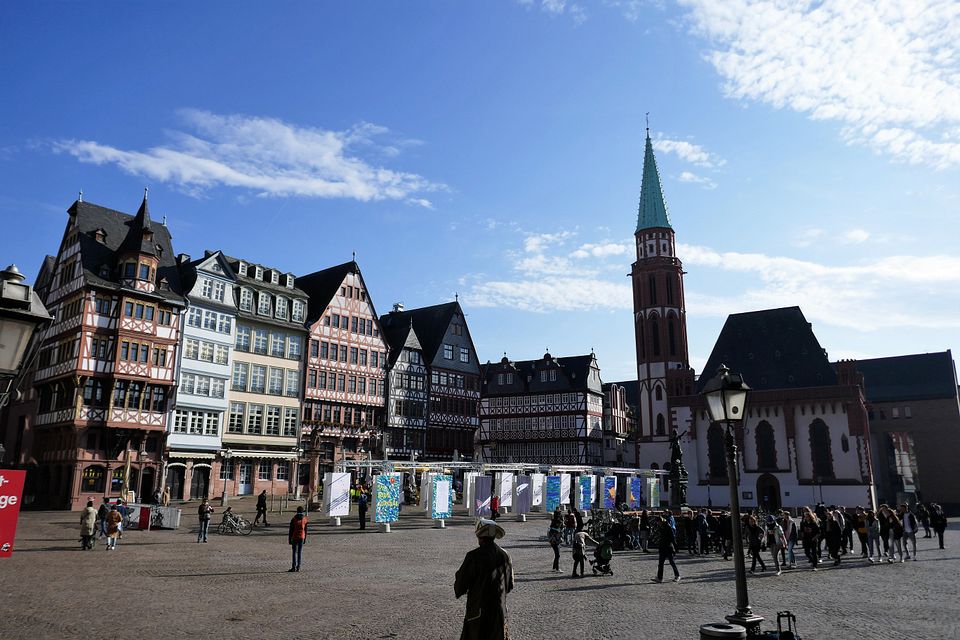
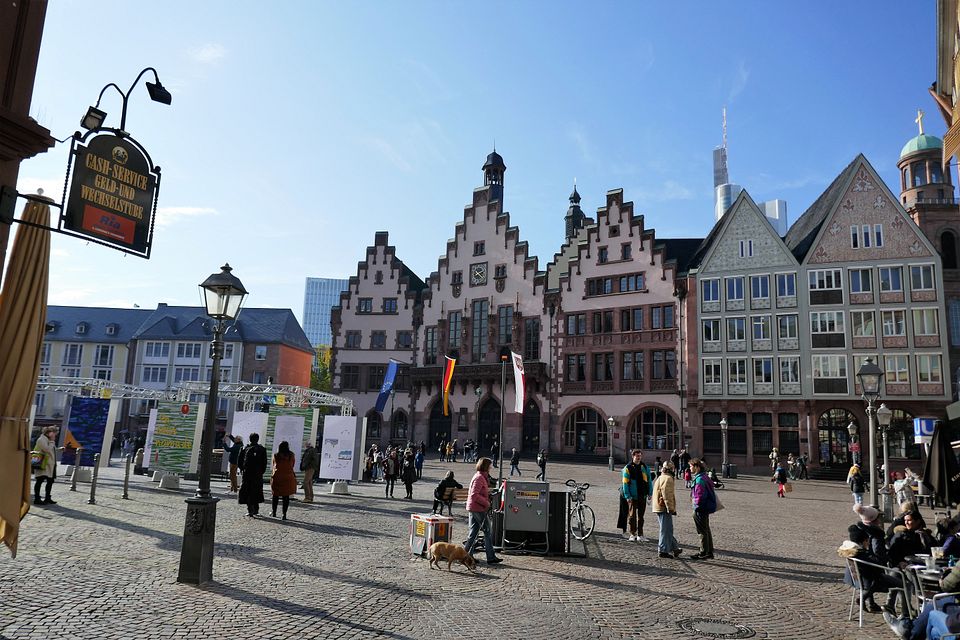
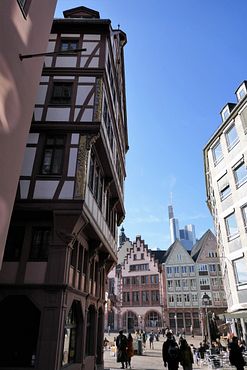
The green double building is the one in place of House Frauenstein where MT lodged. She was standing at the window there, waving at Frank Stephan with her hankerchief when he was coming out of the Cathedral newly crowned, with the processsion leading to the Römer square. This would have been her sight:

A young Lehndorff was also present at Franz Stephan's coronation, but unfortunately did not yet keep a diary to describe his own impressions to us.
On to the cathedral itself.
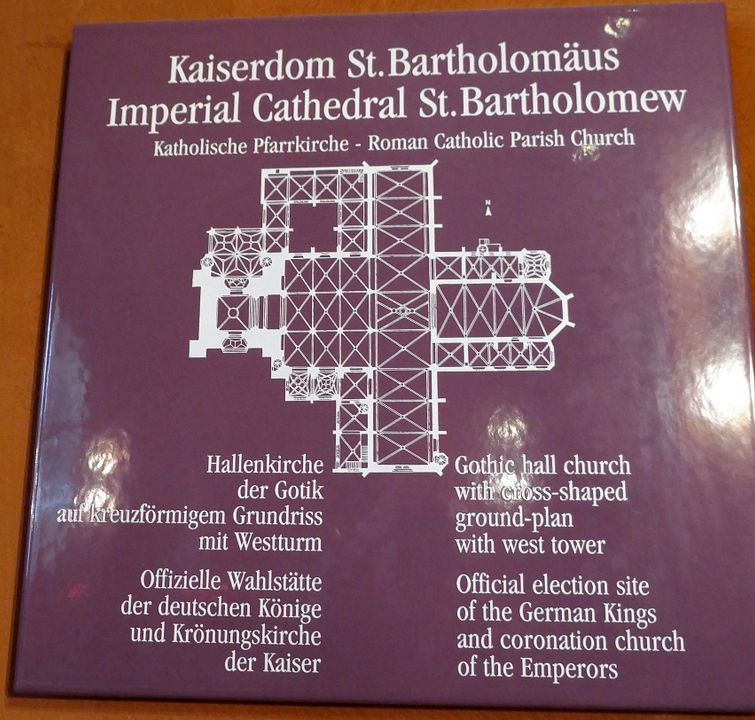
WWII damage:
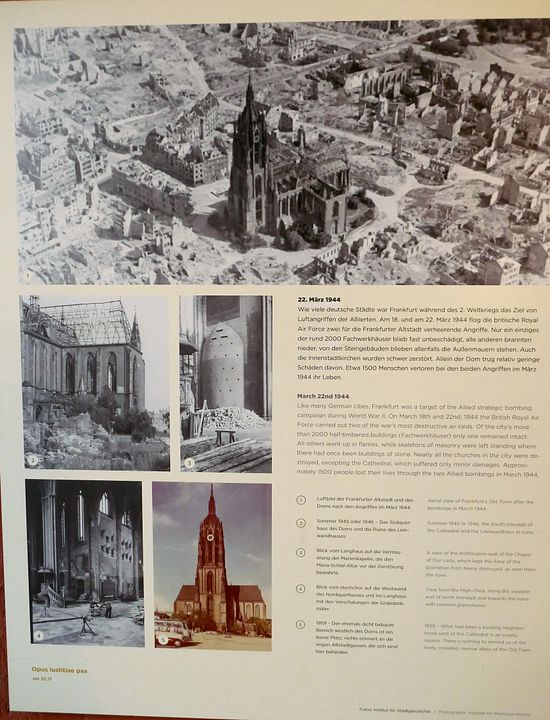
How it looks today from outside:
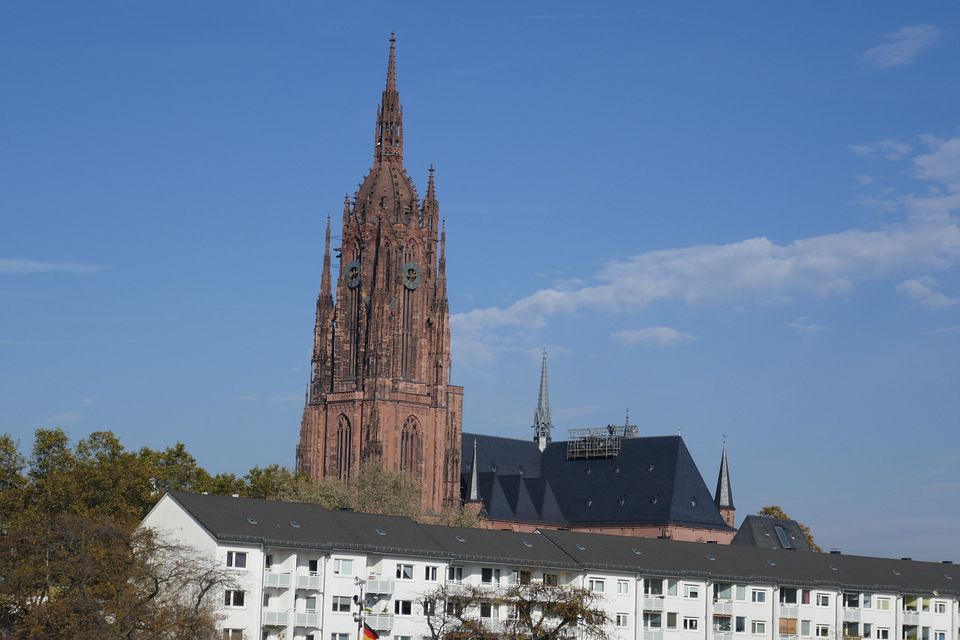
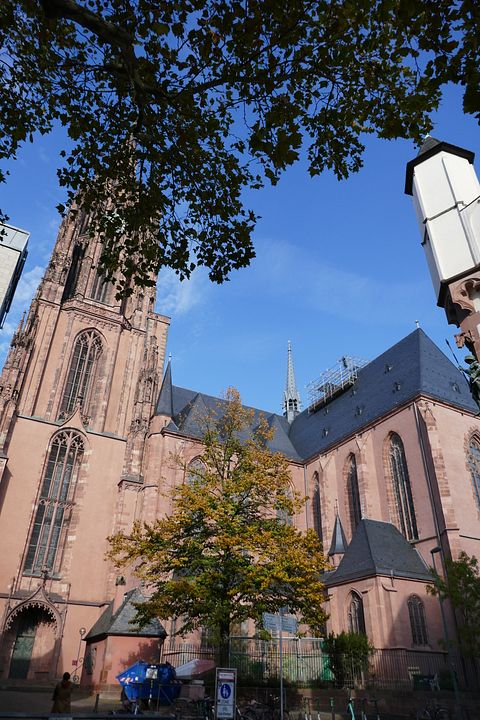
Inside:
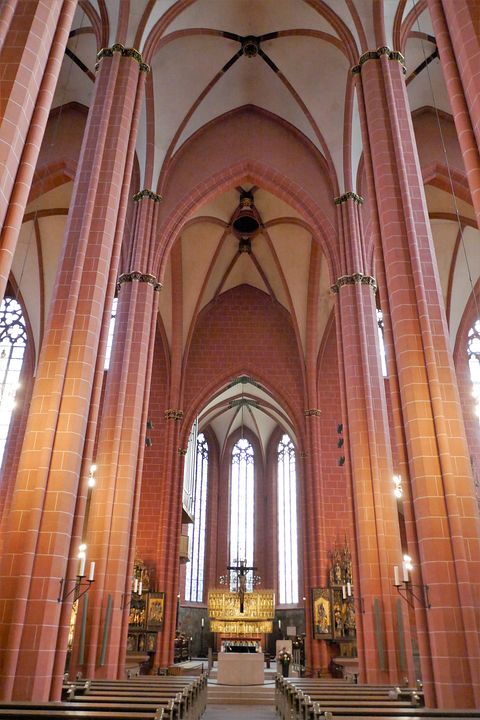
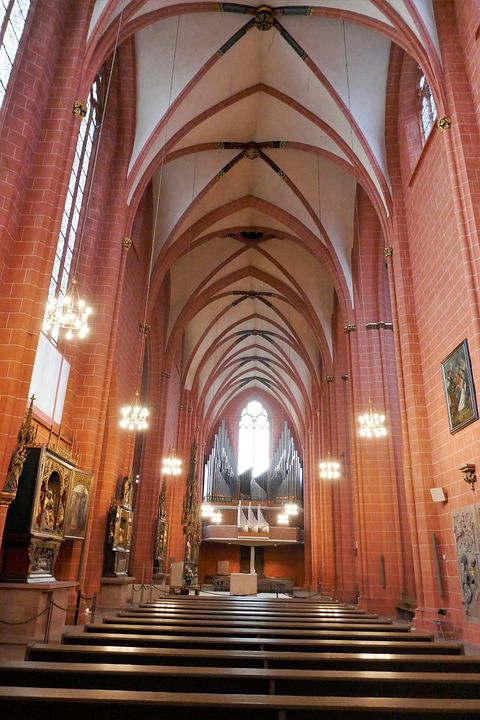
Since it forms a cross, there's also:
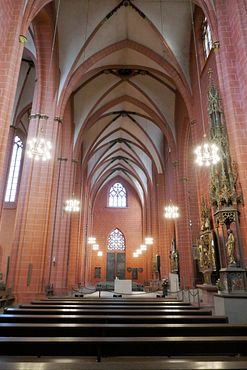
A bit of the original wall painting:
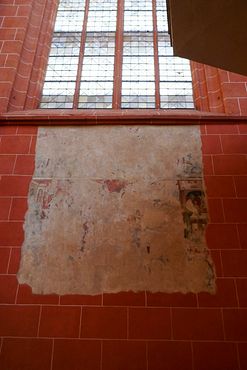
Tomb of a visiting dignitary who died at Frankfurt:
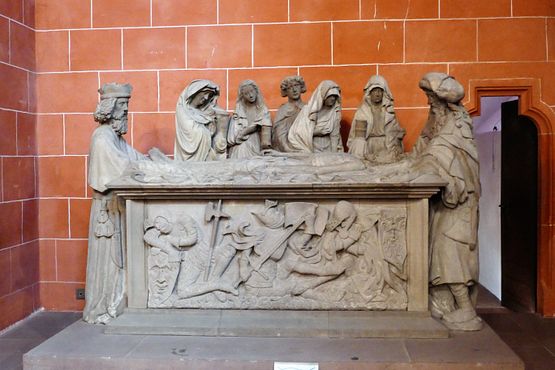
Speaking of tombs. Frankfurt had one of the largest Jewish quarters in Germany, until the Nazis. Who destroyed the synagogues before WWII had started. Part of the cemetary still survives:
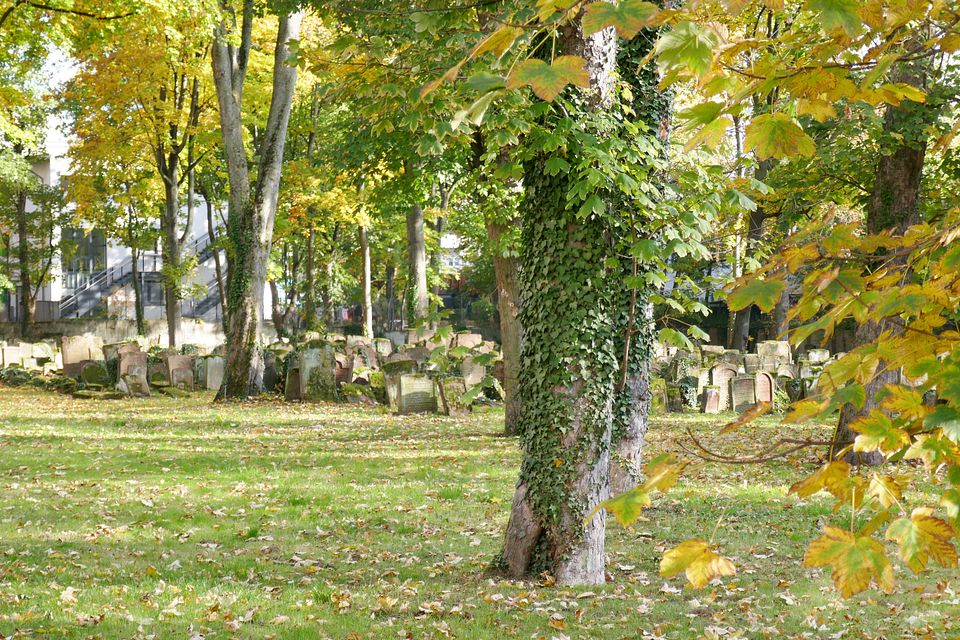
Now, the two inns where Voltaire lodged - both the one he was originally staying at, and the one where he and Madame Denis were locked up in once the Prussian Resident at Frankfurt had them arrested, were in buildings that didn't survive WWII, but you can imagine it looking like this:
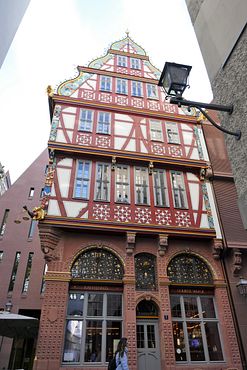
One house that was in terrible shape after WWII but was painfully restored and today is in beautiful shape inside and out is that where Johann Wolfgang (von) Goethe was born and grew up in (and where his mother lived out her life). Goethe's father was a well off Frankfurt citizen, so seeing this house also shows you how by the 18th century, the middle class had acquired enough wealth and education to compete with parts of the impoverished and eternally overspending nobility, at least when it came to town residences. The house from outside:
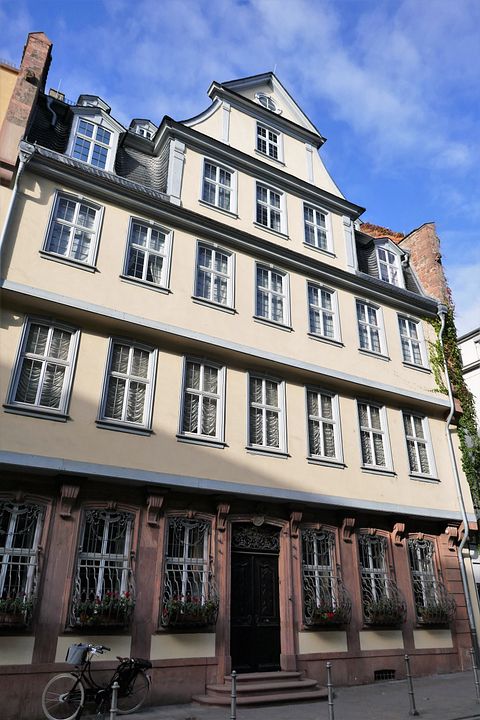
From the garden in the backyard:
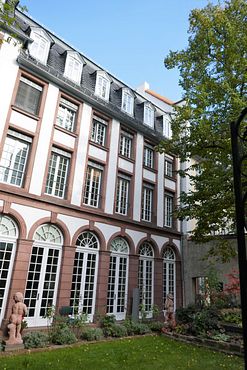
Kitchen in the groundfloor:
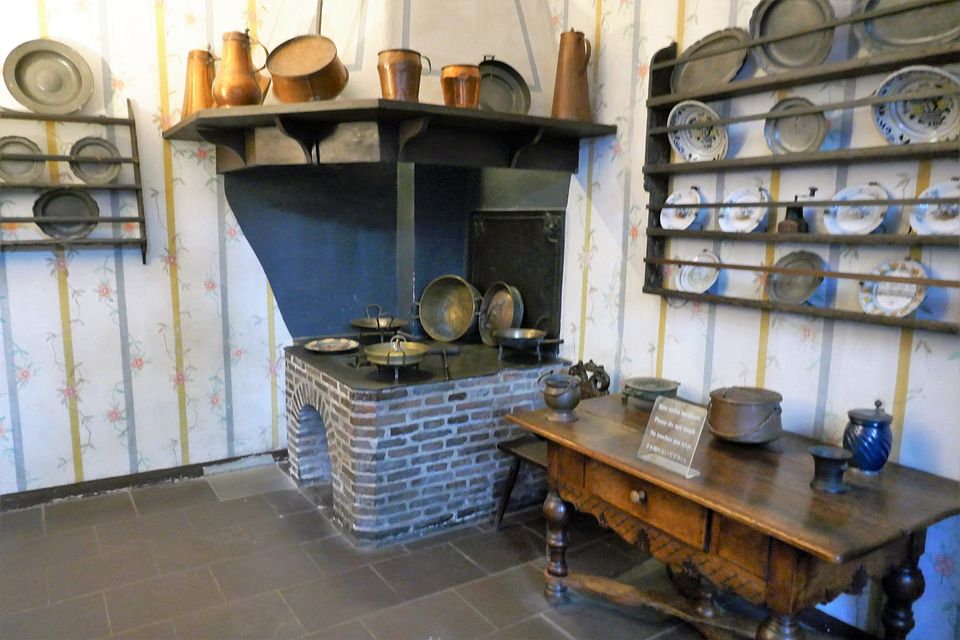
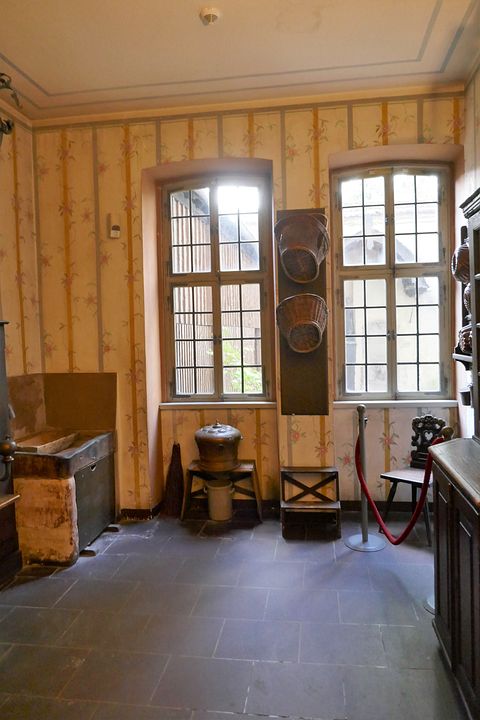
Breakfast salon:
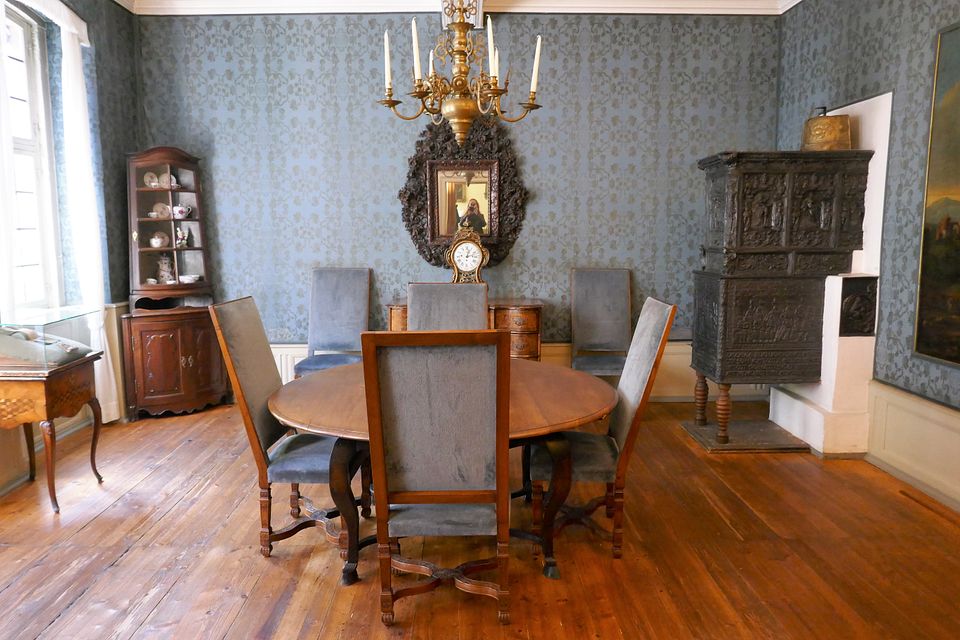
Looks peaceful, wasn't always, especially not during the 7 Years War. Kid!Goethe and his father were Fritz fans. Goethe's mother and his sister Cornelia tried to remain neutral, since her parents were passionate MT fans. When the in-laws were there, the fandom war was on!
Note the stove, too. Most rooms have one, like this big salon for guests in the first floor:
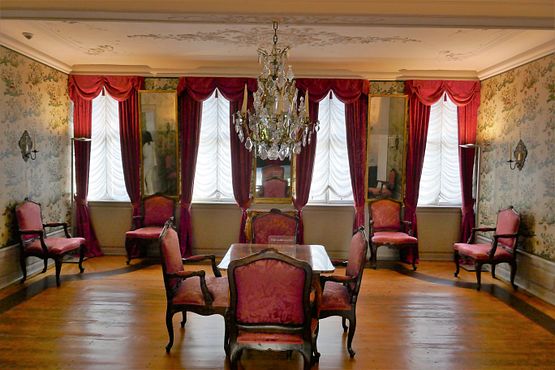
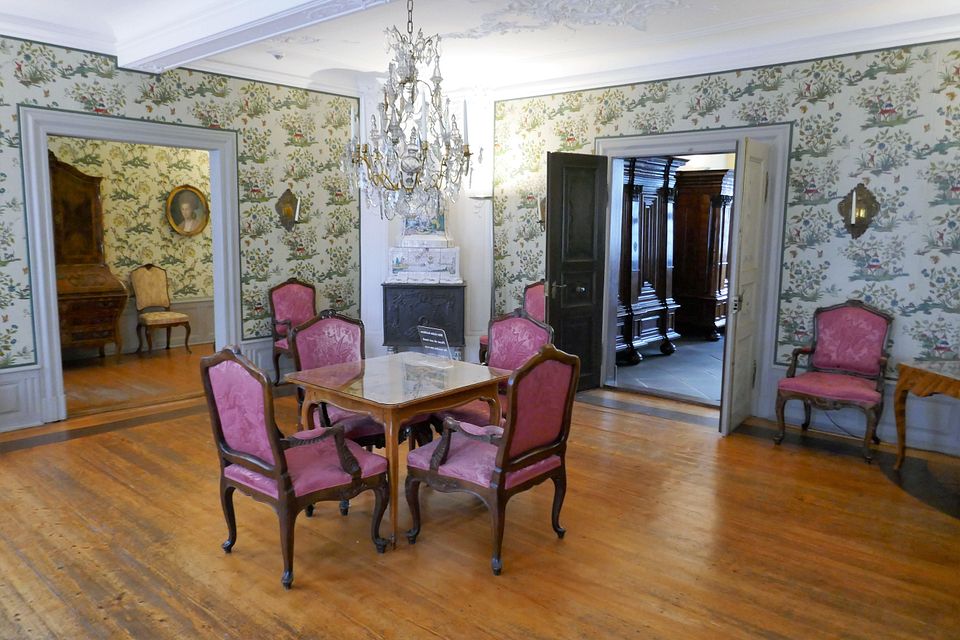
The room of Goethe's sister Cornelia, in the second floor. Like Nannerl Mozart or Fanny Mendelssohn, she's another case of a sister who has great artistic talents, like her brother, is very close to him in childhood and educated in said talents, and then, once puberty hits, told she's only meant for the usual female path of marriage and motherhood.
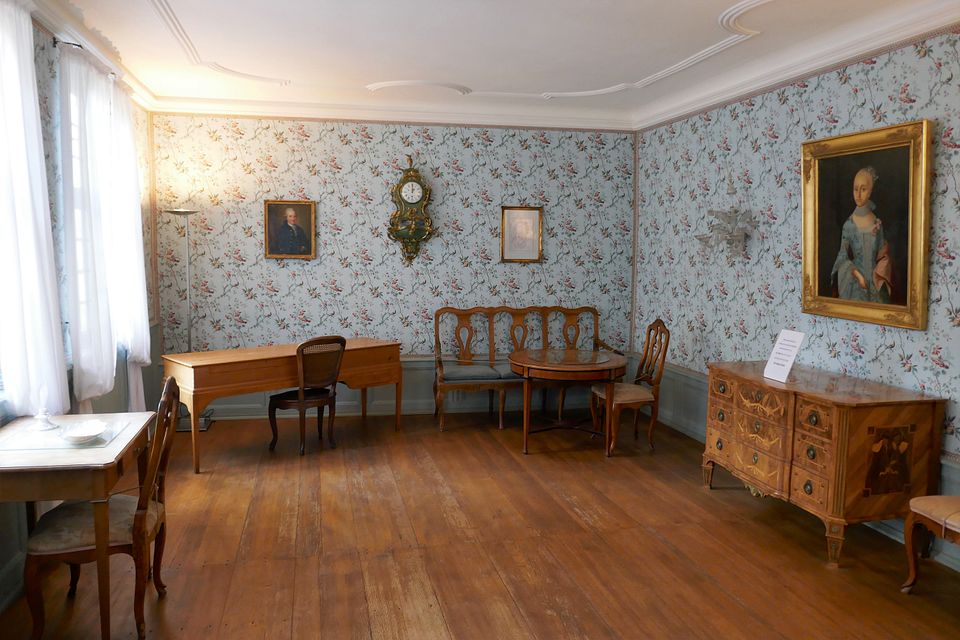
Room of Goethe's mother Katharina, nicknamed "Frau Rat", "Mirs. Councillor", which uses her late husband's title of Councillor:
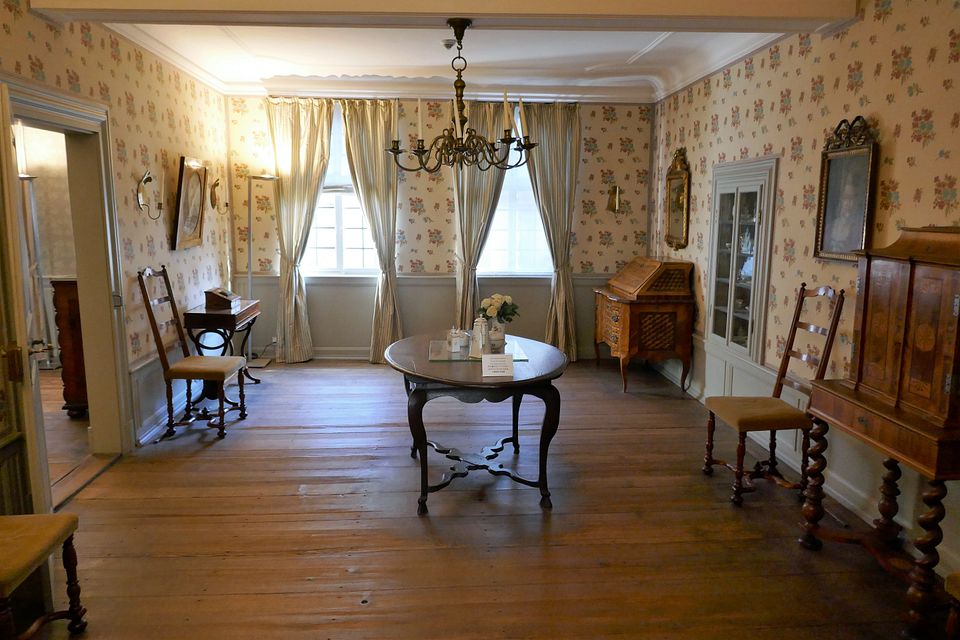
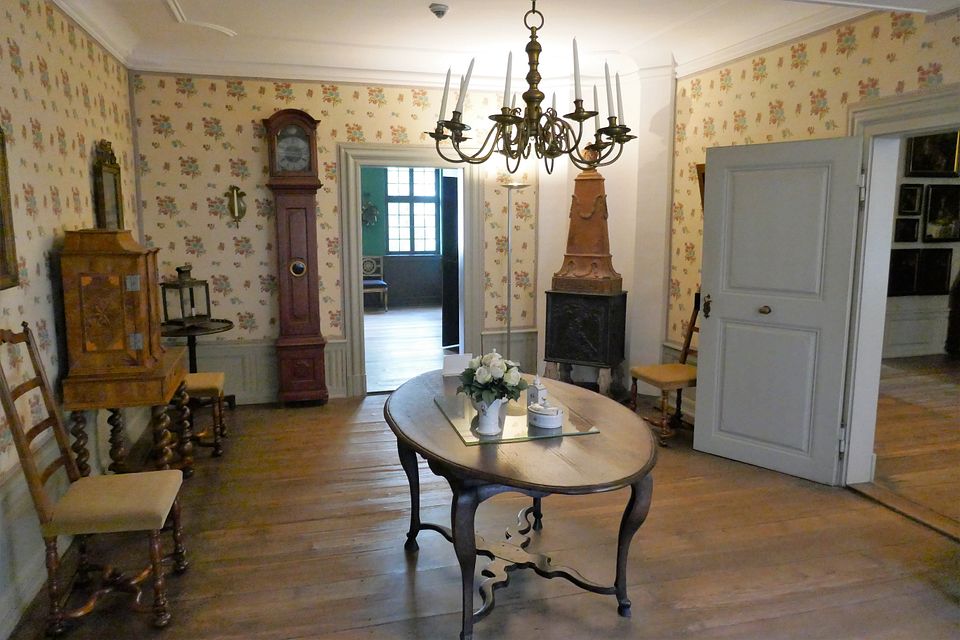
Goethe's father, Johann Kaspar, was a passionate reader who as a young man had travelled to Italy himself (which was very very unusual for a middle class boy in the late 17th/early 18th century), and had a large personal library. He had his children privately educated and very much encouraged them to read.
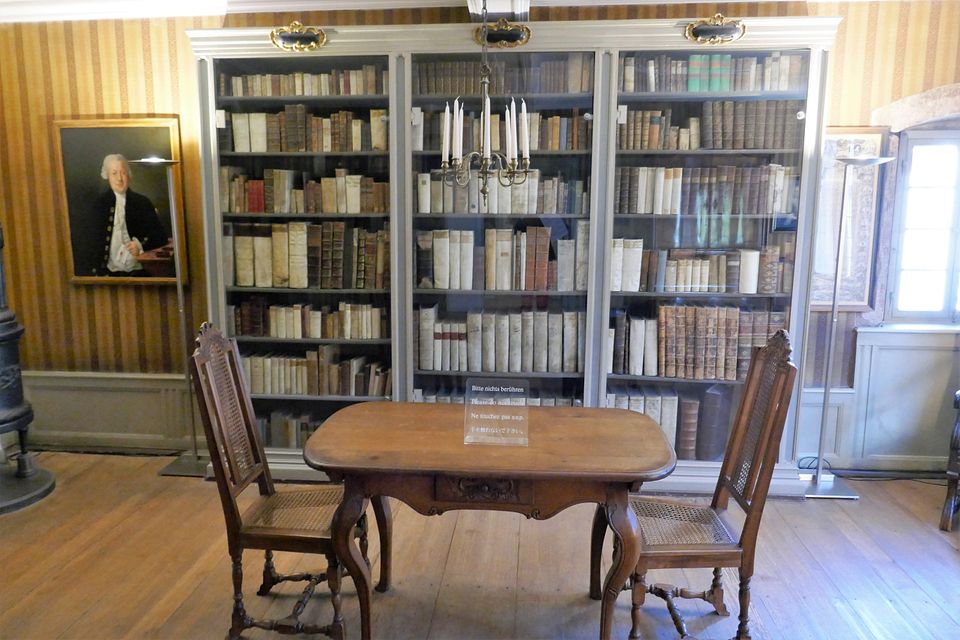

Not a part of the original interior, but of the era: the plaque handed out to Frankfurt citizens in commoration of Joseph's coronation:
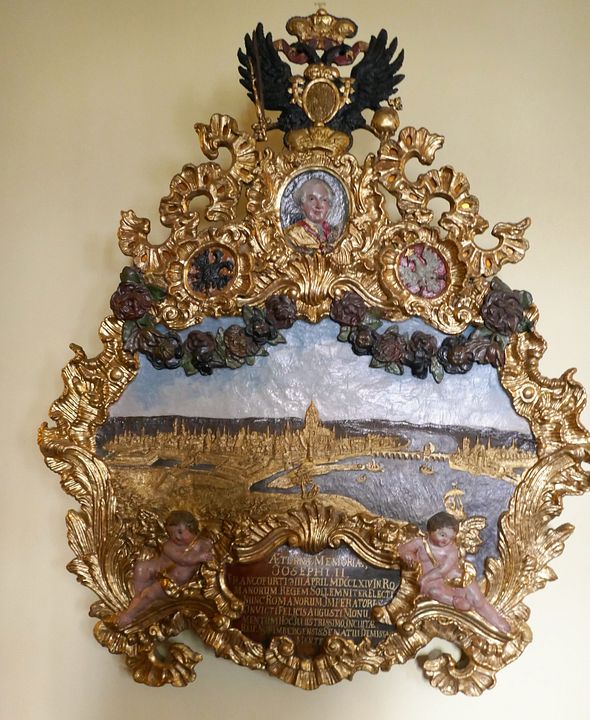
Goethe's room in the third floor:
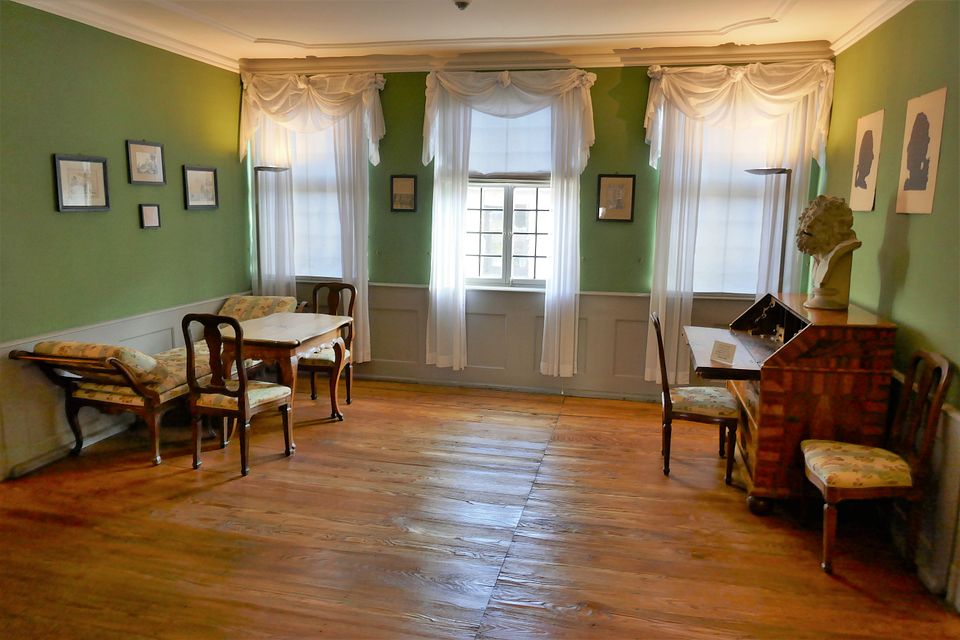
In detail:
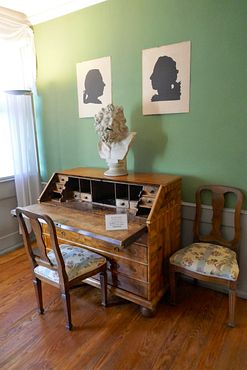
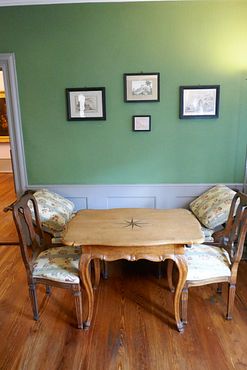
Somehow surviving WWII: the wooden "puppet theatre" which Goethe describes in the novel "Wilhelm Meister". Kid Goethe's passion for puppet theatre also meant he fell in love when a passing troupe presented the story of Faust. 60 Years and a new masterpiece of world literature later....

Announcement of various puppet plays presented in Frankfurt when Goethe was a child:
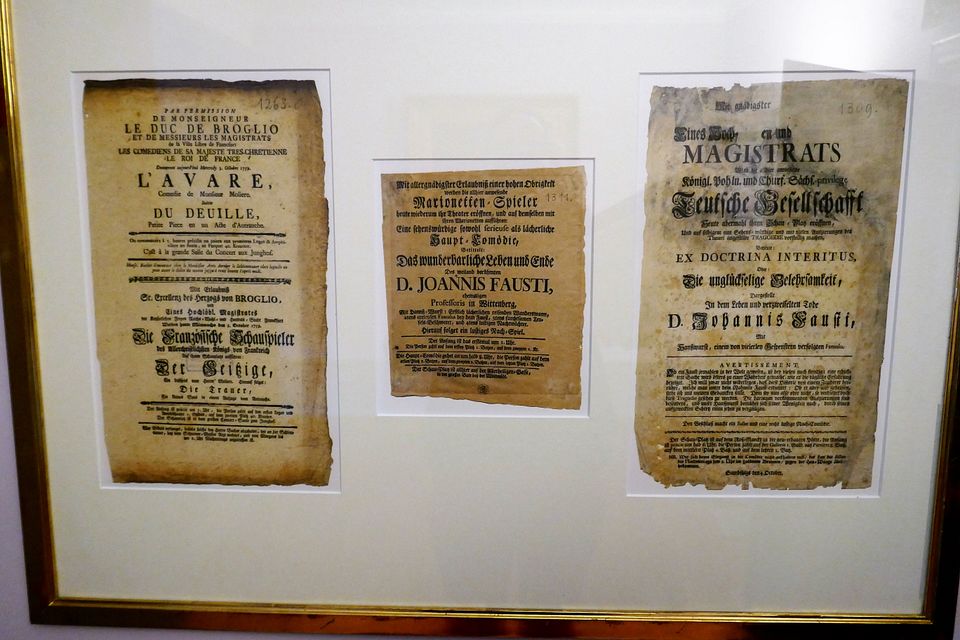
Lastly, there's a small contemporary (to Goethe) painting gallery in the first floor. Here's Anna Amalia, niece of Fritz, daughter of his sister Charlotte, and her two sons Carl August and Konstantin:

Bad Pyrmont, fashionable spa visited by Fritz (and Heinrich), as we know now thanks to![[personal profile]](https://www.dreamwidth.org/img/silk/identity/user.png) felis:
felis:
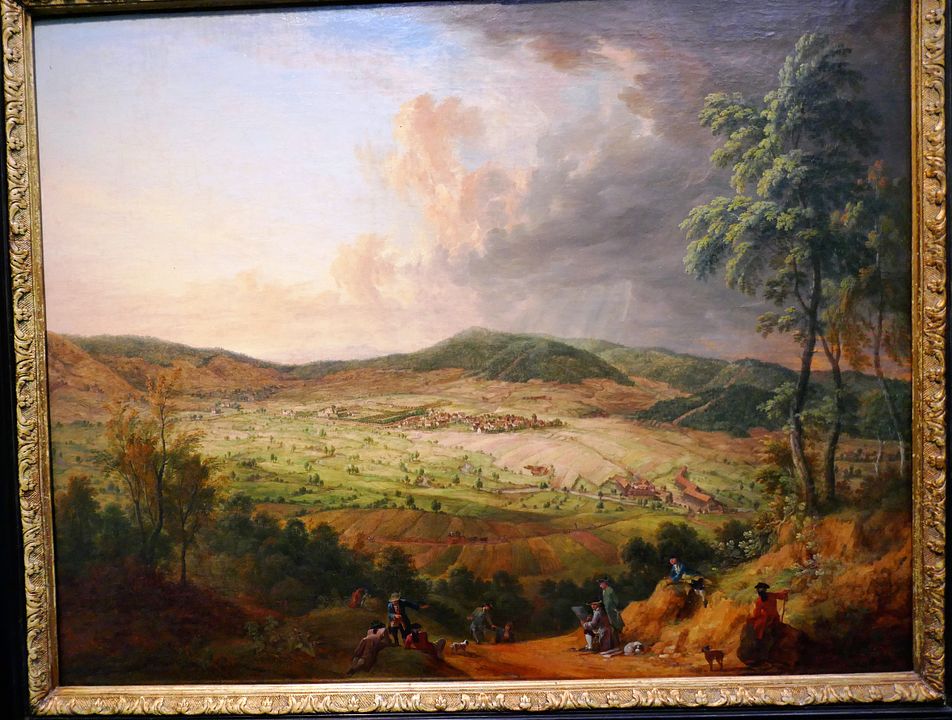
Now the Paulskirche, where the first elected German Parliament assembled in 1848 and drafted a constitiution for a united Germany which was never put in practice due to Friedrich Wilhelm IV. of Prussia being "no, do not want to be a Constitutional Monarch, down with you, rebels!" , has no Frederician relevance, but it's my favourite "what if?", so I include it anyway:

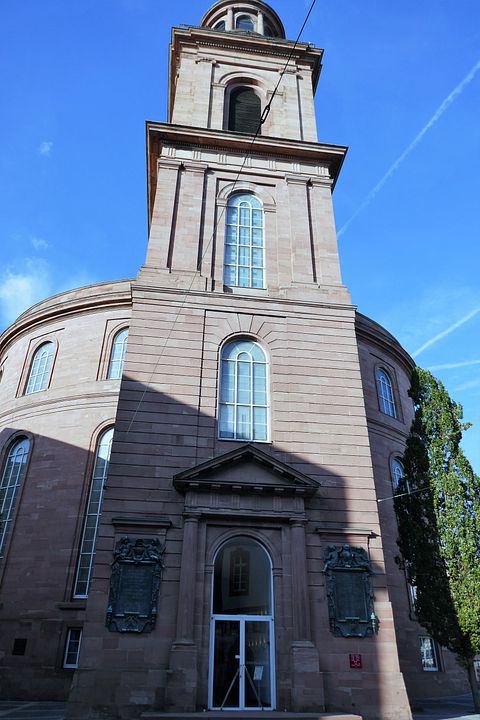
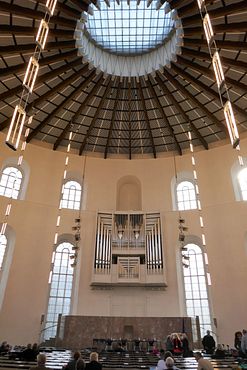

And thus, Mainhattan says adieu:
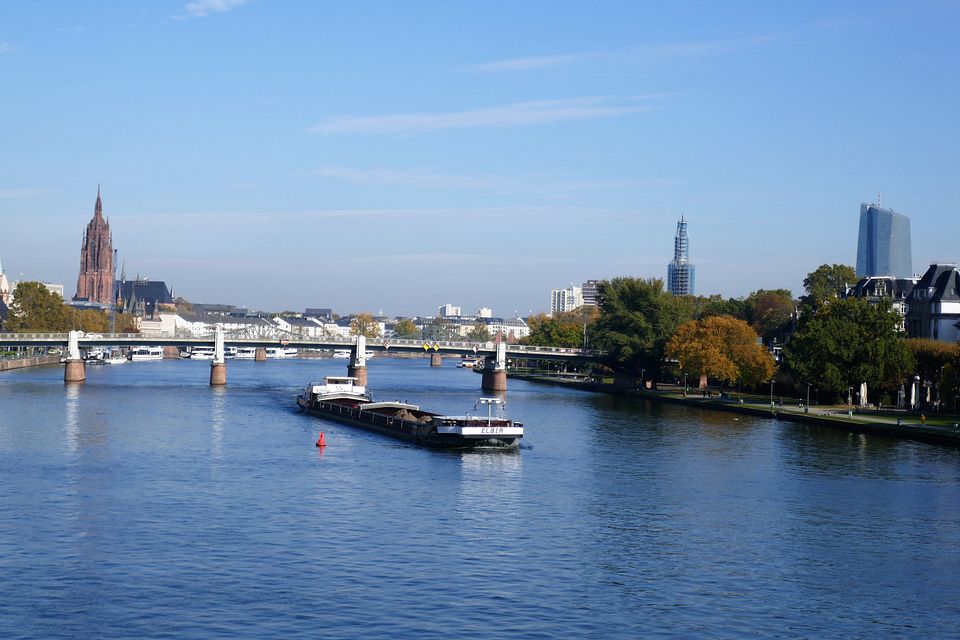

Unfortunately, Frankfurt am Main was heavily bombed in WWII, which is why a lot of the old buildings either had to be rebuild from scratch or at the very least had been burned out, which means their interior had to be reconstructed. Which is also why you see a lot of modern skyscrapers, and the whole town is nicknamed "Mainhattan".


However, reconstruction is a thing. Take the cathedral. Now, the Princes Electors already got together here for voting in the Middle Ages. What they voted for was, strictly speaking, not the Emperor but the King of the Romans (and Germans). Since no one who hadn't been German King first had become Emperor since Charlemagne, you get the point. Having the Imperial coronation here, otoh, was not something regular until the late Renaissance/early Baroque, since most medieval Emperors tried to get crowned by the Pope himself in Rome. The last Emperor to be crowned by the Pope was Charles V., who transferred the site of the coronation to Bologna instead of Rome, given there was still much resentment in Rome for the brutal sacking his toops had inflicted on the city just a few years earlier. Later Emperors simplified their lives and had the coronation in Frankfurt instead, not least because once the Reformation had changed Europe irrevocably, the prestige of being crowned by the Pope was far less than it used to be.
By the 18th century, the voting and the coronation of Emperors still took place in Frankfurt, and we have detailed descriptions by the Duc de Croy of the, shall we say, less than joyful voting and coronation of Karl Albrecht, and by Goethe of both the coronations of Franz Stephan (which he had from his grandparents) and of Joseph (which he saw himself as a teenager). MT could have been crowned as Imperial Consort if she wanted to in Frankfurt; she didn't want to, having been crowned as monarch in her own right in Hungary and Bohemia already. However, she was in Frankfurt as well, several months pregnant, having lunched with Wilhelmine en route. The house where she was staying for her time in Frankfurt, Haus Frauenstein, was utterly destroyed in WWII, and the building now standing there looks rather modern, but overall the square with the city hall, the so called "Römer" (= Roman), is one of the most attractive locations of Frankfurt. Here it is from several angles:



The green double building is the one in place of House Frauenstein where MT lodged. She was standing at the window there, waving at Frank Stephan with her hankerchief when he was coming out of the Cathedral newly crowned, with the processsion leading to the Römer square. This would have been her sight:

A young Lehndorff was also present at Franz Stephan's coronation, but unfortunately did not yet keep a diary to describe his own impressions to us.
On to the cathedral itself.

WWII damage:

How it looks today from outside:


Inside:


Since it forms a cross, there's also:

A bit of the original wall painting:

Tomb of a visiting dignitary who died at Frankfurt:

Speaking of tombs. Frankfurt had one of the largest Jewish quarters in Germany, until the Nazis. Who destroyed the synagogues before WWII had started. Part of the cemetary still survives:

Now, the two inns where Voltaire lodged - both the one he was originally staying at, and the one where he and Madame Denis were locked up in once the Prussian Resident at Frankfurt had them arrested, were in buildings that didn't survive WWII, but you can imagine it looking like this:

One house that was in terrible shape after WWII but was painfully restored and today is in beautiful shape inside and out is that where Johann Wolfgang (von) Goethe was born and grew up in (and where his mother lived out her life). Goethe's father was a well off Frankfurt citizen, so seeing this house also shows you how by the 18th century, the middle class had acquired enough wealth and education to compete with parts of the impoverished and eternally overspending nobility, at least when it came to town residences. The house from outside:

From the garden in the backyard:

Kitchen in the groundfloor:


Breakfast salon:

Looks peaceful, wasn't always, especially not during the 7 Years War. Kid!Goethe and his father were Fritz fans. Goethe's mother and his sister Cornelia tried to remain neutral, since her parents were passionate MT fans. When the in-laws were there, the fandom war was on!
Note the stove, too. Most rooms have one, like this big salon for guests in the first floor:


The room of Goethe's sister Cornelia, in the second floor. Like Nannerl Mozart or Fanny Mendelssohn, she's another case of a sister who has great artistic talents, like her brother, is very close to him in childhood and educated in said talents, and then, once puberty hits, told she's only meant for the usual female path of marriage and motherhood.

Room of Goethe's mother Katharina, nicknamed "Frau Rat", "Mirs. Councillor", which uses her late husband's title of Councillor:


Goethe's father, Johann Kaspar, was a passionate reader who as a young man had travelled to Italy himself (which was very very unusual for a middle class boy in the late 17th/early 18th century), and had a large personal library. He had his children privately educated and very much encouraged them to read.


Not a part of the original interior, but of the era: the plaque handed out to Frankfurt citizens in commoration of Joseph's coronation:

Goethe's room in the third floor:

In detail:


Somehow surviving WWII: the wooden "puppet theatre" which Goethe describes in the novel "Wilhelm Meister". Kid Goethe's passion for puppet theatre also meant he fell in love when a passing troupe presented the story of Faust. 60 Years and a new masterpiece of world literature later....

Announcement of various puppet plays presented in Frankfurt when Goethe was a child:

Lastly, there's a small contemporary (to Goethe) painting gallery in the first floor. Here's Anna Amalia, niece of Fritz, daughter of his sister Charlotte, and her two sons Carl August and Konstantin:

Bad Pyrmont, fashionable spa visited by Fritz (and Heinrich), as we know now thanks to

Now the Paulskirche, where the first elected German Parliament assembled in 1848 and drafted a constitiution for a united Germany which was never put in practice due to Friedrich Wilhelm IV. of Prussia being "no, do not want to be a Constitutional Monarch, down with you, rebels!" , has no Frederician relevance, but it's my favourite "what if?", so I include it anyway:




And thus, Mainhattan says adieu:
